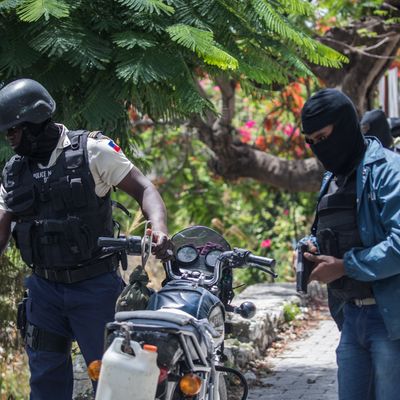
Less than a week after the assassination of Haitian president Jovenel Moïse, some connections have reportedly emerged between the suspects and the private-contractor apparatus and law enforcement in the United States.
In the attack last Wednesday, which Haitian authorities claimed involved at least 28 assailants, the strike team yelled that they were involved in a “DEA operation,” according to a video recorded by residents in the neighborhood. On Monday, the Drug Enforcement Agency issued a statement to CNN claiming that “at times, one of the suspects in the assassination of Haitian President Jovenel Moïse was a confidential source to the DEA.” The agency states that after the assassination, “the suspect reached out to his contacts at the DEA,” at which point an agent urged him to surrender to Haitian authorities. CNN reports that it is “not clear that the men who worked as US law enforcement informants wittingly participated in the assassination plot or were aware of the mission.”
According to a top government official in Port-au-Prince, two American citizens have been arrested in connection to the attack; in a statement to CNN, the State Department said it was aware of the arrests. Seventeen other suspects apprehended were Colombian, 11 of whom have been identified by the Colombian Defense Ministry as former military members. (Five additional suspects are still at large, according to Haitian police.) On Thursday, a Pentagon spokesman told the Washington Post that some of the Colombians suspects were trained by U.S. forces. “A review of our training databases indicates that a small number of the Colombian individuals detained as part of this investigation had participated in past U.S. military training and education programs, while serving as active members of the Colombian Military Forces,” said Lt. Col. Ken Hoffman.
On Monday, Haitian authorities also arrested Christian Emmanuel Sanon, a Haitian doctor based in Florida. According to police chief Léon Charles, Sanon “arrived by private plane in June with political objectives and contacted a private security firm to recruit the people who committed this act.” (In a raid of his home, police found a DEA hat in addition to ammunition and four license plates from the neighboring Dominican Republic.) Charles also said that Sanon hired contractors from a security firm based in Florida, called CTU, run by a Venezuelan émigré named Antonio Enmanuel Intriago Valera. The detained Colombians also claimed a connection to the firm active in Doral, according to the Miami Herald:
Multiple sources in Haiti, requesting anonymity for their safety, have confirmed to the Herald that the detained men said they were hired by CTU, and several of the men indicated they had been in Haiti for at least three months, some longer. It is unclear if they knew or believed CTU leaders were aware of the assassination plot.
The men were hired to provide VIP security, one source in Haiti said, and were paid about $3,000 a month.
As Haitian officials investigate the plot that threw the nation into a constitutional crisis, a Biden administration official told NPR that the U.S. is sending FBI and Department of Homeland Security agents “as soon as possible to assess the situation and how we may be able to assist.” Haiti’s interim government has also requested a U.S. troop presence, which Pentagon spokesman John Kirby said on Monday the Department of Defense was “reviewing.”






























